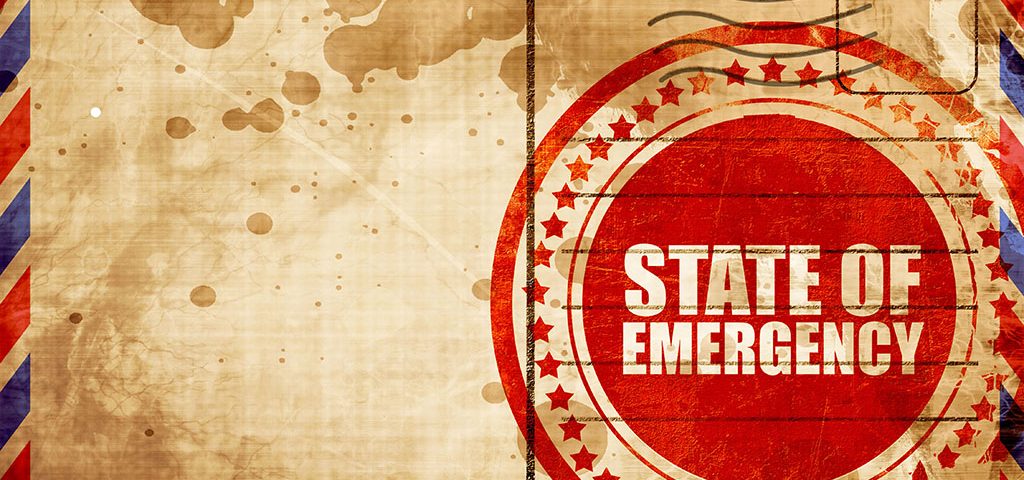- WE’RE HERE TO HELP | SE HABLA ESPAÑOL
- 800.586.5555
State and Federal Emergency Declarations
State and Federal Emergency Declarations

Every state in the country, and the federal government, has emergency declaration laws and funds. Emergency declaration funds are literally rainy-day funds. They can only be accessed if officials formally declare a state of emergency, and in Florida that’s most frequently when a hurricane makes landfall or passes nearby.
Governors aren’t the only officials with the ability to declare a state of emergency. In many states, emergencies can be declared by:
- Health agency directors
- Emergency management agency directors
- Homeland security directors
- Agricultural directors
Many local jurisdictions can activate their own local states of emergency based on specific criteria they set themselves.
Each state’s emergency declaration laws specify certain circumstances that justify a declaration. Governors tend to have more declaration leeway than local officials or department heads. Public health emergencies like COVID-19 can count as disasters that justify declarations. It’s also possible for more than one disaster to be declared concurrently.
What’s Included in the Emergency Declaration?
- The dates and duration of the declaration
- The areas effected by the declaration
- The conditions that justified the declaration
- Rules and regulations that will be suspended or modified during the declaration
In some circumstances an executive order may be adequate for an emergency declaration, but in other cases a governor may require legislative approval. For example, a governor may be able to order the initial emergency declaration but will require a legislative approval to extend that emergency after the original duration expires.
Some emergencies declared by agency directors may also require governor or legislative approval.
Health and Human Service’s Roll in Federal Emergency Declarations
Under normal circumstances the Secretary of Health and Human Services (HHS), one of the president’s cabinet members, is at the top of the food chain in emergency declaration management. As the federal official in charge of protecting the health and safety of all Americans, their goal is to ensure everyone in the nation has access to essential health, welfare and income security programs.
The HHS Secretary is granted extra powers if the president issues an emergency declaration under Section 301 and Section 311 of the Public Health Service Act. Declaring an emergency activates:
- Financial, logistical, technical and personnel assistance
- Provisions that ease certain regulatory restrictions on government officials and employees
- A number of emergency response protocols and systems, such as the National Response Framework and the National Incident Management System
Some of those measures give government employees more legal protections and makes it harder to hold them accountable for their actions. There may be situations where it will be harder to hold a government employee liable for injuries they cause to citizens or businesses during a state of emergency.
Section 311 is the most relevant to the current COVID-19 crisis. It gives the HHS secretary authority to help states and local officials with the prevention and suppression of communicable disease, including the power to assist local authorities with regional and federal quarantine enforcement. Section 311 also gives the HHS secretary authority to develop a public health emergency management plan for virus outbreaks.
Section 319F-2 of the Public Health Services Act is the section pertaining to the Strategic National Stockpile, which also got a lot of attention (and some criticism) during the pandemic. This stockpile includes not only vaccines, PPE and medical devices but also the biological products to mass produce vaccines and medicine. The stockpile is deployed to the states according to the HHS secretary and the Assistant Secretary for Preparedness and Response’s orders. Unfortunately, there have historically been cases where partisan politics have impacted the distribution of this stockpile.
When Can the President Declare a Major Disaster or Emergency?
The trigger is intentionally vague because disasters are nearly always unexpected and, in many cases, of an unpredictable nature. Any event or threat that does or has the potential to overwhelm state and local governments may justify an emergency declaration.
Given the ease with which an emergency can be declared, and their inherent subjectiveness, it’s no surprise emergency declarations are sometimes motivated by politics.
For example, President Trump’s 2019 national emergency declaration pertaining to the U.S.-Mexico border. His decision was predicated by congress failing to give him all the money he demanded to build a border wall. The administration claimed no actual disaster funds would be taken from things like hurricane emergency funds but would instead be pulled from the Department of Defense, drug forfeiture funds and military construction budgets.
The Supreme Court overturned challenges brought against the emergency order by the Sierra Club, which is an example of the extraordinary latitude granted to presidential emergency orders. President Biden rescinded the emergency declaration on his first day in office.
Get Help After a Hurricane in Florida
Home and business owners shouldn’t rely solely on the government to protect them from hurricane-related property damage. Emergency declarations may loosen some restrictions and government funds for disaster recovery, but there’s no guarantee you will qualify.
The best thing you can do to protect your investments is making sure you have adequate flood, home and business insurance.
